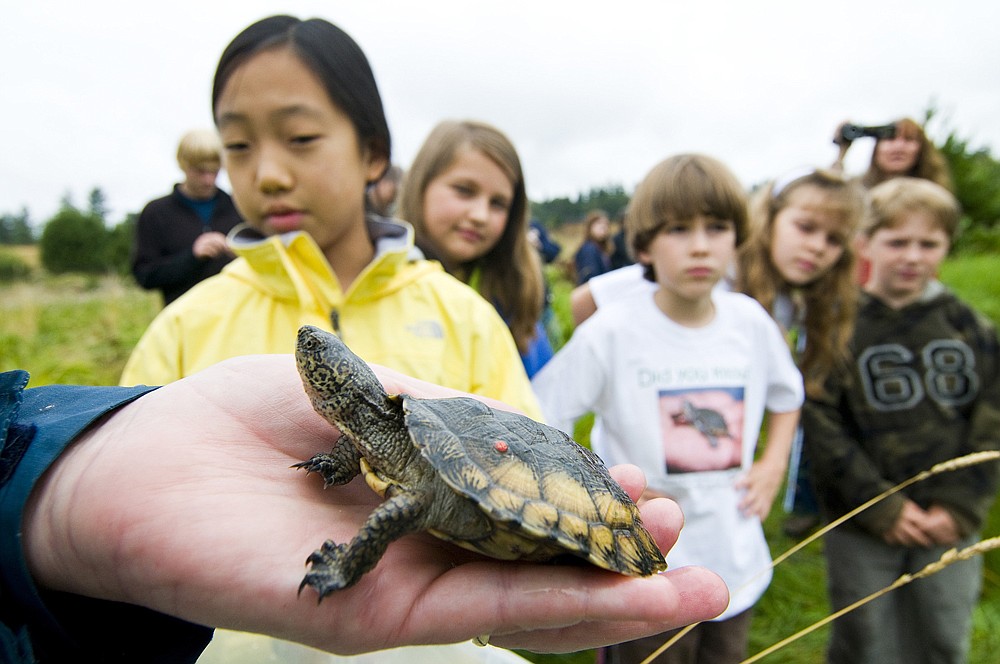Seattle’s Woodland Park Zoo release rare turtles to swim their way back to the wild
July 3, 2012 at 12:21 p.m.
On August 3, 2012, approximately 90 western pond turtles were released to the wild in Pierce and Mason Counties and the Columbia River Gorge when Washington Department of Fish and Wildlife and Woodland Park Zoo teamed up again to help bolster the population of the endangered species.
In 1990, only about 150 western pond turtles remained in the wild in Washington. These last remaining individuals struggled for survival as they battled predation by the non-native bullfrog, disease and habitat loss.
In 1991, the Western Pond Turtle Recovery Project was established to help bring the imperiled species back from the brink of extinction. The state listed western pond turtles as endangered in 1993.
Thanks to the collaborative recovery project, the native population has been restored to about 1,500 individuals surviving in the state.
The turtles scheduled for release were collected from the wild as eggs, hatched and “head started” at Woodland
Park Zoo to improve their chance of survival in the wild. Once the turtles reach a suitable size of about 2 ounce -- large enough to escape the large mouths of bullfrogs and large-mouth bass – they are returned to their homes and closely monitored by biologists.
The largest of the 10-month-old turtles will be equipped with tiny radio transmitters glued to their shells so biologists can learn more about post-release dispersal, habitat use during active and hibernation periods and, ultimately, their survival rate.
Head starting and releasing the turtles is a part of the Western Pond Turtle Recovery Project, a long-term, collaborative effort among Woodland Park Zoo, Oregon Zoo, Washington Department of Fish and Wildlife, and the U.S. Fish and Wildlife Service. The goals of the conservation project are to re-establish self-sustaining populations in Puget Sound and the Columbia River Gorge regions and for young turtles from wild nests to survive without head starting in zoos.
Western pond turtles were once common from Baja California to Puget Sound, including the Columbia River Gorge. However, loss of habitat, disease and predation by non-native species such as bullfrogs decimated their numbers. Today, the turtles are found in Washington wetlands at six sites in Klickitat, Skamania, Pierce and Mason counties that contain a variety of permanent and seasonal ponds, sloughs, rivers, and marshes surrounded by grasslands, oak woodlands, conifer forests or mixed oak/pine forests.
Over the last two decades, the recovery project has catalyzed the purchase and management of 425 acres of wildlife habitat with pristine wetlands near the Columbia River Gorge. The humble western pond turtle serves as a focal endangered species for ensuring the habitat stewardship of an additional 300 acres in the Gorge area and Puget Sound lowlands, and has become an “umbrella species” saving countless plants and animals living in wetland habitats in Washington.
Scientists tracking the released turtles estimate that 95 percent of the turtles released back into the Columbia River Gorge have survived, and nearly all of the turtles released back in Pierce, Mason, Skamania and Klickitat Counties have survived.
To help restore these rare pond turtles to their natural habitat, recovery workers take to the field each year. WDFW attaches transmitters to adult female western pond turtles and monitors the turtles every two hours during the nesting season to determine their nesting sites. The nests are protected with wire exclosure cages to help prevent predators from eating the eggs. In the fall, eggs and hatchlings are collected and transported to Woodland Park and Oregon Zoos, where they can grow in safety.
Unlike wild turtles, zoo turtles are fed throughout the winter, so by their summer release, the 10 month olds are approximately as big as 3-year-old turtles that grew up in the wild.
This coming November, biologists, conservation scientists, and endangered species recovery specialists from the Washington Department of Fish and Wildlife, Oregon Zoo, Woodland Park Zoo, U.S. Fish and Wildlife Service, and the World Conservation Union's (IUCN's) Conservation Breeding Specialist Group will participate in a Population Habitat Viability Assessment Workshop to review the status of Washington's recovering turtle population to determine future actions, including the possibility of acquiring or restoring additional wetlands sites.
In addition to the Western Pond Turtle Recovery Project, Woodland Park Zoo plays an active role in turtle conservation around the globe, such as support of the Turtle Survival Alliance. The zoo also collaborates with other zoos, aquariums and wildlife agencies on Northwest native species recovery projects such as Oregon spotted frogs and Oregon silverspot butterflies.





